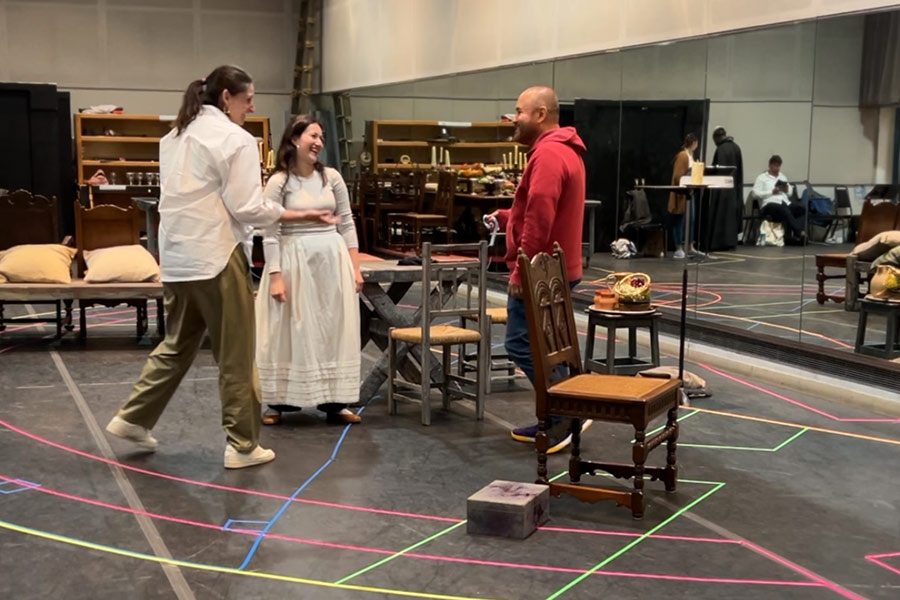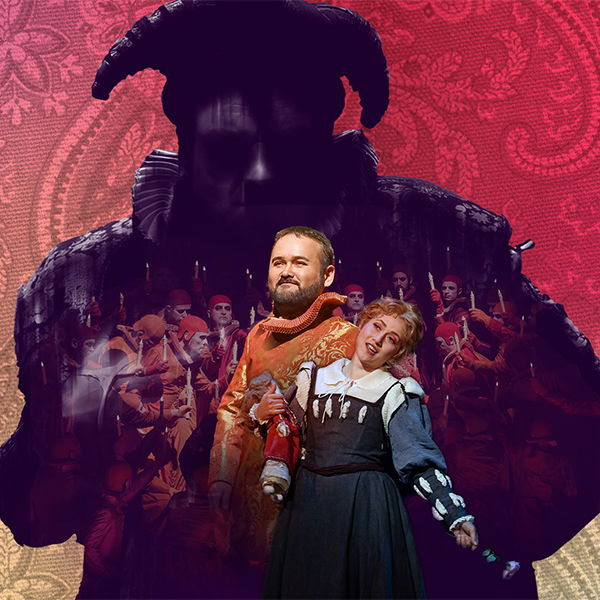September 12, 2024
Director's note: Rigoletto
One of the most rewarding aspects of directing standard repertoire is the opportunity to re-examine characters who were crafted before the dawn of modern dramaturgy in order to try to give voice to their stories with sufficient complexity and agency.
Is a woman a priceless treasure worth stealing, or a worthless and interchangeable commodity ("Questa o quella")? The conflict within Rigoletto about the value of women (despite their virginity — or rather, the loss of it) exists within every courtier in the stormy, godless autocracy of Mantua in the 1550s. The repellent attitudes of the charismatic Duke and his cronies (and Rigoletto, when it comes to women who are not related to him), set to Verdi's catchiest music makes us understand why the censors of the composer's own day were "triggered" by the work.
Two often overlooked details of the text of the libretto fashioned after Victor Hugo's play haunted me as I thought about telling the story of Rigoletto and his daughter to the audience at Lyric: the absence of an actual Duchess of Mantua from the stage and the story, and Gilda's complete lack of any memory of her mother, who died when Gilda was a helpless infant. These two clues pointed me to a world where women were completely absent.
Mantua is a court without "the female touch" — the out-of-court Duchess of Mantua (in a striking parallel with the Last Duchess in the poem of Robert Browning, Verdi's contemporary) is present only in a fresco on the wall. Rigoletto's wife is an angel (but she is dead), and women who serve at the pleasure of the court are just trying to survive. Women don't have a voice at the Duke's court: Verdi didn't include a female chorus. Even when women are dressed as men — like the Page, or Gilda in the final act — they are always lacking some critical piece of information, and, as a result, are disenfranchised.

Director Mary Birnbaum works with the cast of Rigoletto during a staging rehearsal.
In light of this prevalent power dynamic, it's easy at first to imagine Gilda as a victim of sexual assault who has been brainwashed by her subservient love for the Duke. Gilda's actions to save a despicable if vocally sweet seducer despite his disregard for her are, by modern-day standards, indefensible, a pure hangover from the trauma he has caused.
Then I started to think about Gilda's core need, even before the Duke enjoys and then abandons her, to have her father tell her about their family, about her mother, to learn any shred of personal detail; she even begs Rigoletto to disclose his — their — family name. I began to think: What if, in the grand tradition of teenage girls, Gilda was a partial agent rather than a victim? What if she has been thinking of other ways to escape the perpetual and suffocating nameless present that her father has trapped her in, even as he claims that her lockdown only stems from his paternal love?
The Duke's romancing fulfills a deep need when he gives Gilda a name to hang her dreams of a future on — a name for herself no matter how silly — Gualtier Maldè. From the Duke, Gilda receives a purpose and a mission — to make his name hers or go down trying.
I researched the history of abduction during the 16th century in Italy, which reveals that women were political property although not always and not necessarily in a purely sexual way. What if, though Gilda's abduction was terrifying, her experience at court was not? "Tutte le feste," Gilda's confession, includes her own guilt at betraying her father's wishes, but she shares no details of her encounter with the Duke. It may be obvious to read her omission as a confession of an act of violence, but what if her shame was not wholly due to survivor's guilt but instead was the shame of a daughter who had ambitions — a life with a name of her own — outside of what her father demanded? How would the story change if Gilda's consent had been given on the basis of a life of stability promised, even if falsely, to Gilda by the Duke?
These are the questions with which I started to re-stage and re-envision a 19-year-old production using the pre-existing design. For inspiration in staging the bodies within the storm, I looked to Caravaggio and, possibly more importantly, the great 17th-century artist Artemisia Gentileschi, a sexual assault victim who took matters into her own storytelling hands both by painting her rapist and calling him out in legal proceedings. I felt that Gilda, even if denied this full agency by her death, deserves her own story, and I have tried to let her tell it.

